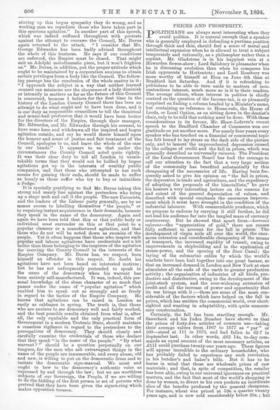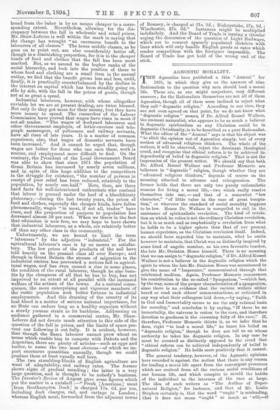PRICES AND PROSPERITY.
POLITICIANS are always most interesting when they avoid politics. It is natural enough that a speaker who is generally employed in defending a partisan position through thick and thin, should feel a sense of moral and intellectual expansion when he is allowed to treat a subject temperately and rationally, as a philosopher rather than a sophist. Mr. Gladstone is in his happiest vein at a Hawarden flower-show ; Lord Salisbury is pleasanter when he is discussing evolution than when he compares his Irish opponents to Hottentots ; and Lord Rosebery was more worthy of himself at Eton on June 4th than at Bradford last Saturday. And if it is refreshing to politicians to be able to turn aside to matters of non- contentious interest, much more so is it to their readers. The average citizen, whose interest in politics is chiefly centred on the question of the Income-tax, is as pleasantly surprised on finding a column headed by a Minister's name, but containing no reference to Home-rule, the House of Lords, or Local Option, as on sitting down in the dentist's chair, only to be told that nothing need be done. With these considerations in its favour, Mr. Shaw-Lefevre's recent speech to the Bradford Chamber of Commerce won our gratitude on yet another score. For nearly four years every speaker who has touched on a financial or commercial topic has felt bound to lay stress on the dark side of the picture only, and to lament the unprecedented depression caused by the collapse of credit and the fall in prices, which was generally described as universally ruinous. The President of the Local Government Board has had the courage to call our attention to the fact that a very large section of the community has benefited substantially by this cheapening of the necessaries of life. Having been fre- quently asked to give his opinion on "the fall in prices, the depression in trade and agriculture, and the expediency of adopting the proposals of the bimetallists," he gave his hearers a very interesting lecture on the reasons for and extent of the general depreciation of values, and described with special emphasis the enormous improve- ment which it must have wrought in the condition of the industrial labourer. With commendable prudence, which we propose to endorse by carrying it still further, he did not lead his audience far into the tangled maze of currency controversy. But he showed that apart from—horresco referens—the "appreciation of gold," there are causes fully sufficient to account for the fall in prices. The development of virgin soils all over the world, the enor- mous extension and considerable cheapening of the means of transport, the increased rapidity of transit, owing to improvements in shipbuilding and in the application of steam-power, and the opening of the Suez Canal; the laying of the submarine cables by which the world's markets have been knit together into one great bazaar, so that an increased demand in London and New York at once stimulates all the ends of the earth to greater productive activity ; the organisation of industries of all kinds, pro- ductive and distributive, owing to the development of the joint-stock system, and the ever-widening extension of credit and all the increase of power and opportunity that its use brings with it ;—these are some of the more con- siderable of the factors which have helped on the fall in prices, which has smitten the commercial world, ever short- sighted and wanting in adaptability, with quite unneces- sary consternation.
Certainly, the fall has been startling enough. Mr. Sauerbeck and his Index Number have shown us that the prices of forty-five articles of common use—taking their average values from 1867 to 1877 as " par " or 100—stood at 111 in 1873, and had fallen to 62.7 in September last. In other words, £62 14s. to-day com- mands an equal amount of the most necessary articles, as £111 could purchase twenty-one years ago. These figures will appear incredible to the ordinary householder, who has probably failed to experience any such revolution in his butcher's and baker's bills. But it has to be borne in mind that these are wholesale prices of raw materials ; and that, in spite of competition, the retailer has been able, owing to our universal ignorance on practical matters, and the fact that most of the world's shopping is done by women, to divert to his own pockets an inordinate slice of the benefits produced by the general cheapness. For instance, wheat was priced at 52e. a quarter twenty years ago, and is now sold, considerably below 20s.; but bread from the baker is by no means cheaper to a corre- sponding extent. Nevertheless, allowing for the dis- crepancy between the fall in wholesale and retail prices, Mr. Shaw-Lefevre is well within the mark in saying that the change has wrought "an enormous benefit to the labourers of all classes." The lower middle classes, as he goes on to point . out, are also considerably better off, though in a diminishing proportion, for it is in the cheaper kinds of food and clothes that the fall has been most marked. But, as we ascend to the higher ranks of the social hierarchy, and look into the position of those to whom food and clothing are a small item in the annual outlay, we find that the benefit grows less and less, until, finally, it is practically counterbalanced by the decline in the interest on capital which has been steadily going on, side by side, with the fall in the prices of goods, though not at so great a speed. Industrial labourers, however, with whose altogether enviable lot we are at present dealing, are twice blessed. Not only do they get more for their money, but they have more money to spend. The researches of the Labour Commission have proved that wages have risen in most if not all trades. "The wages of dockyard labourers and other Government employs, of letter-carriers and tele- graph messengers, of policemen and railway servants, have all risen of late years. It is a matter of common experience, also, that wages of domestic servants have been increased." And it cannot be urged that, though wages are better for those who can earn them, work is scarcer, and employment more difficult to find. On the contrary, the President of the Local Government Board was able to show that since 1871 the population of Great Britain has increased by nearly seven millions, and in spite of this huge addition to the competitors in the struggle for existence, "the number of persons in receipt of poor relief has been reduced, relatively to the population, by nearly one-half." Here, then, are three hard facts for well-intentioned enthusiasts who contend that labour is ground under the heel of a bloodthirsty plutocracy,—during the last twenty years, the prices of food and clothes, especially the cheaper kinds, have fallen phenomenally, wages "in most, if not all, trades" have risen, and the proportion of paupers to population has decreased almost 50 per cent. When we throw in the fact that education is now free, we may hope to have shown that industrial labourers, as a whole, are relatively better off than any other class in the community. Unfortunately, we are bound to limit the term " labourers " by the adjective "industrial." For the agricultural labourer's case is by no means so satisfac- tory. The low prices of the products of the soil have told heavily on the peasant class all over Europe ; and though in Great Britain the stream of migration to the industrial centres has prevented a serious fall in agricul- tural wages, and has even caused a rise in some places, the condition of the rural labourer, though he also bene- fits by the cheapness of all that he has to buy, has not improved to an extent at all parallel with the increased welfare of the artisan of the towns. As a natural conse- quence, the more enterprising and vigorous members of the rustic population seek better fortune in industrial employments. And this draining of the country of its best blood is a matter of serious national importance, for no State can endure long as a healthy organism without a sturdy yeoman strain as its backbone. Addressing an audience gathered in a commercial centre, Mr. Shaw- Lefevre did not devote much attention to this side of the question of the fall in prices, and the limits of space pre- vent our following it out fully. It is evident, however, that though the Essex labourer cannot grow wheat on terms which enable him to compete with Dakota and the Argentine, there are plenty of articles—such as eggs and butter, to name the two most obvious—of which we im- port enormous quantities annually, though we could produce them at least equally well here. The two stumbling-blocks of English agriculture are want of adaptability, and railway rates. The former shows signs of gradual mending ; the latter is a very large question, and is thought to be nobody's business. The Investor's Review of August gave some figures which put the matter in a nutshell :—" Fresh [American] meat [from Southampton Dock] is charged 17s. 6d. per ton, including dock charges, rail, and cartage in London ; whereas English meat, forwarded from the adjacent towns of Romsey, is charged at 31s. 3d. ; Bishopstoke, 27s. 9c1. ; Winchester, 27s. 9d." Instances might be multiplied indefinitely. And the Board of Trade is issuing a circular urging the discussion of the question of Light Railways, which are to connect sparsely populated districts with lines which will only handle English goods at rates which render competition with the foreigner impossible. The Board of Trade has got hold of the wrong end of the stick.



















































 Previous page
Previous page